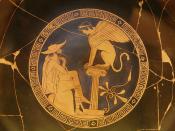Oedipus- His Character
Aristotle says in his poetics that Sophocles drew men "as they ought to be". But Oedipus, with heinous acts as he did, is this what he meant by what a man ought to be? Of course not, this isn't the way Aristotle meant us to interpret the statement in this way, and this will be discussed in the following paragraphs.
In the opening scene, Sophocles presents Oedipus as a wise and benevolent ruler. The following lines by the priest: "It was you, we remember, as a newcomer to Cadmus' ancient town, that broke our bondage to the vile Enchantress." Lines 35-6, "But as we truly believe, with the help of the gods, you gave us back our life." Lines 37-8 "Your diligence saved us once" Line 42 Phrases such as this prove Oedipus was a good king of Thebes.
The priest even calls Oedipus "greatest of men" which is later repeated by the chorus at the end.
Oedipus is not only a good king, he knows he is and this is apparent in the way he talks about himself: "I Oedipus whose name is known afar" Lines 6-7
Oedipus had two disagreements in the play, first with Tieresias and then with Creon. Though he over-reacted by suspecting Creon, one cannot blmae him for getting mad at Tieresias' supposed slander. On the other hand , according to the dialogue, Oedipus was so preocupied by his own theories that he was obivious to any other point of view, includind the truth. This can be refered to as Oedipus' ignorance, as aforesaid, but it is better to refer it to a flaw in his character.
Possibly one of the most famous scenes in the play, though not shown, is Oedipus; self-blinding scene. Directly after hearing...


